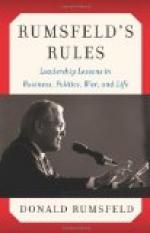I should have expected the advance parties of Sir C.F. Clery’s force to have fallen back as the Boers approached. The attempt to keep up the connection between the parts of a concentrating force by means of the railway strikes me as very dangerous from the moment that the enemy is in the neighbourhood. The important thing for Sir C.F. Clery is not whether his battle takes place twenty miles nearer to Ladysmith or twenty miles farther away, but that it should be an unmistakable victory, so that after it the Boer force engaged should be unable to offer any further serious hindrance to his advance. To gain an end of this kind a general should not merely bring up all the troops from the rear, falling back for them if necessary, but should take care that none can be cut off by the enemy in his front. A decisive victory by Sir C.F. Clery or by Sir Redvers Duller, who may feel this action to be so important as to justify his presence, would leave no doubt as to the issue of the war. An indecisive battle would postpone indefinitely the relief of Ladysmith and leave the future of the campaign in suspense. Defeat would be disastrous, for it would probably involve the ultimate loss of Sir George White’s force. For these reasons I regard the battle shortly to be fought in Natal as the first decisive action of the war, and am astonished that a larger proportion of Sir Redvers Buller’s force has not been sent to take part in it.
The whole business of a commander-in-chief in war is to find out the decisive point and to have the bulk of his forces there in time. If he can do that on the half-dozen occasions which make the skeleton of a war he has fulfilled his mission. He never need do anything else, for all the rest can be done by his subordinates. Not every commander fulfils this simple task because not every one refuses to let himself be distracted. All sorts of calls are made upon him to which he finds it hard to be deaf; very often he is doubtful whether one or another subordinate is competent, and then he is tempted to do that subordinate’s work for him. That is always a mistake because it means neglect of the commander’s own work, which is more important.
The task, though it appears simple is by no means easy, as the present war and the present situation show. While the fate of the Empire hangs in the balance between Ladysmith and Pietermaritzburg, a good deal depends on the course of events between Kimberley and Queenstown. In the northern part of Cape Colony the Dutch inhabitants are naturally divided in their sympathies, and the loyally disposed have been sorely tried by the long weeks of waiting for some sign of Great Britain’s power. None has yet been forthcoming. They know that Kimberley is besieged and that the British Government has done little for its defence. During the last week or two they have been threatened by the Free State Boers, and have seen Stormberg and other places evacuated by the British. At length the Free State Boers




